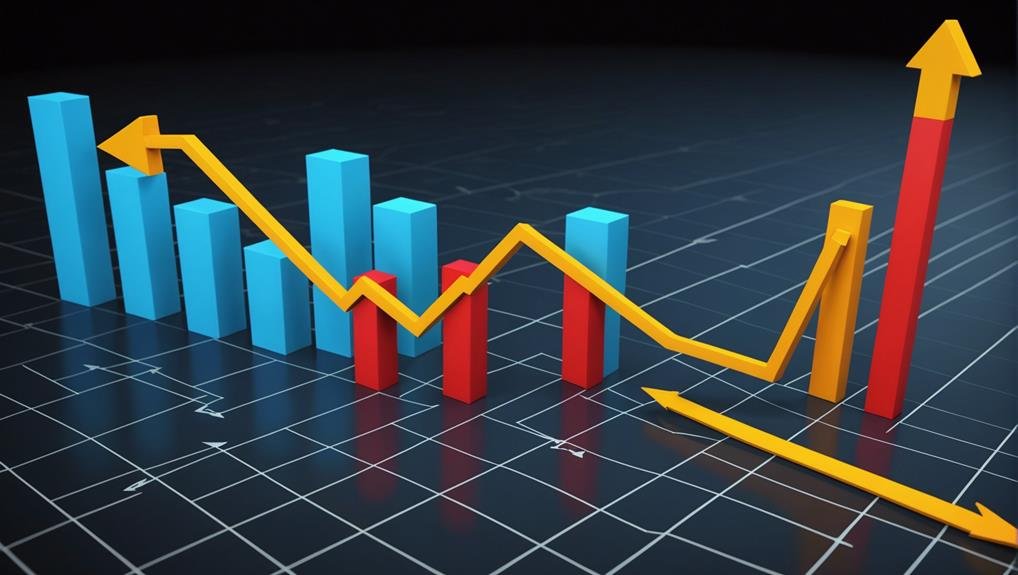Development Economics Definition and Types Explained
In development economics, the focus lies on fostering economic growth, reducing poverty, and creating pathways for advancement in developing nations. The field encompasses theories like Mercantilism, Economic Nationalism, and the Linear Stages of Growth Model to guide policy design. Strategies involve implementing policies in infrastructure, education, and healthcare to drive economic progress. Models aid in understanding market dynamics and formulating effective policies. Applications of development economics impact financial stability and offer guidance for sustainable growth through evidence-based insights. Understanding these aspects is essential for addressing developmental challenges effectively. Further exploration offers deeper insights into this dynamic field.
Key Takeaways
- Development economics focuses on economic growth and poverty reduction.
- It encompasses theories like Mercantilism, Economic Nationalism, and Linear Stages of Growth.
- Strategies in development economics involve policy implementation and structural transformation.
- Models aid in understanding market dynamics and guiding sustainable development strategies.
- Applications include informing financial stability, policy guidance, and effective decision-making.
Key Concepts in Development Economics
In the domain of development economics, key concepts serve as fundamental pillars that underpin the strategies and theories aimed at enhancing fiscal, economic, and social conditions in developing countries.
Economic growth stands as a central tenet, focusing on increasing the productivity and overall economic well-being of a nation. This growth is essential for lifting countries out of poverty and fostering sustainable development.
Poverty reduction is another critical concept, emphasizing the need to alleviate deprivation and improve living standards for populations in developing nations. By addressing poverty through targeted interventions and policies, development economics aims to create pathways for prosperity and socio-economic advancement in these regions.
These concepts are pivotal in shaping the frameworks and approaches used to drive progress and transformation in developing economies.
Theories of Development Economics
Various theoretical frameworks in development economics provide insightful perspectives on the dynamics of economic progress in developing countries. Mercantilism emphasizes state power, market monopolization, and trade surplus as drivers of economic growth.
On the other hand, Economic Nationalism stresses domestic control, limits globalization, and advocates for high tariffs to protect local industries.
In contrast, the Linear Stages of Growth Model highlights the importance of industrialization in achieving economic advancement, while the Structural-Change Theory focuses on shifting economies from agrarian to industrial structures.
Each theory offers unique insights into the paths countries can take to foster development and improve living standards. Understanding these theories and their implications is essential for policymakers and economists seeking to design effective development strategies.
Strategies for Development Economics
An in-depth analysis of effective strategies in development economics reveals diverse approaches tailored to specific socio-political contexts. Policy implementation plays a vital role in driving economic growth in developing countries. Governments often adopt a mix of policies focusing on areas such as infrastructure development, education, healthcare, and trade to foster sustainable economic growth.
Successful strategies in development economics involve careful consideration of population dynamics, structural transformation, and investment in human capital. The effective implementation of these policies can lead to increased productivity, improved living standards, and reduced poverty levels.
Models in Development Economics
Exploring the diverse models utilized in development economics provides valuable insights into the intricate dynamics of economic growth in developing countries. These models play an essential role in understanding the factors influencing economic growth and market dynamics in these nations.
The focus on economic growth within these models helps in identifying strategies to foster sustainable development and reduce poverty levels. By analyzing market dynamics, such as supply and demand forces, competition levels, and regulatory frameworks, these models aid in formulating policies that can enhance market efficiency and promote economic stability.
Understanding the interplay between economic growth and market dynamics is essential for designing effective interventions to address developmental challenges in developing economies.
Applications of Development Economics
Analyzing the practical implementation of development economics principles illuminates the tangible impact on financial stability and policy guidance in both domestic and international contexts.
In the domain of financial stability, development economics explores the strategies and mechanisms that emerging nations employ to achieve economic resilience and sustainable growth. This analysis involves examining factors such as investment patterns, debt management, and monetary policies to foster stability amidst various economic challenges.
Moreover, in the domain of policy guidance, development economics plays an important role in informing decision-makers about effective strategies to address developmental issues, reduce inequalities, and promote economic prosperity. By providing evidence-based insights and recommendations, development economics guides the formulation of policies at the national and international levels, shaping a more equitable and prosperous future.
Conclusion
In the intricate tapestry of development economics, theories, strategies, models, and applications intertwine to form a roadmap towards progress and prosperity for developing nations.
Like a skilled artisan weaving threads of knowledge and innovation, economists navigate the complexities of economic growth, social well-being, and sustainable development.
Through their collective efforts, a brighter future emerges on the horizon, where disparities are reduced, and nations flourish in harmony.







